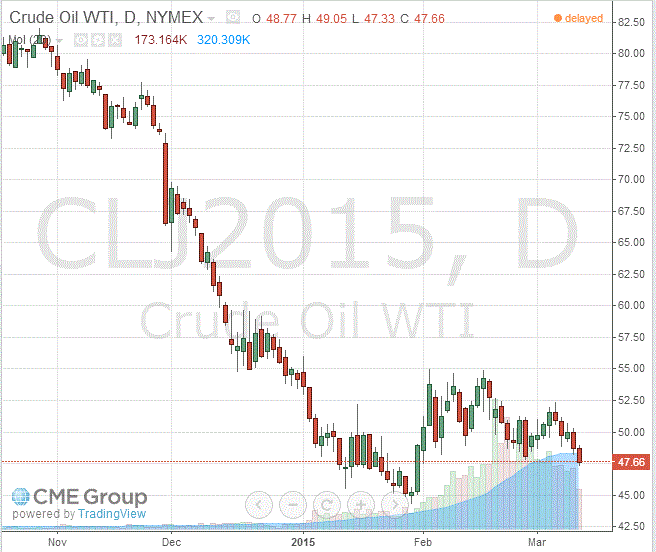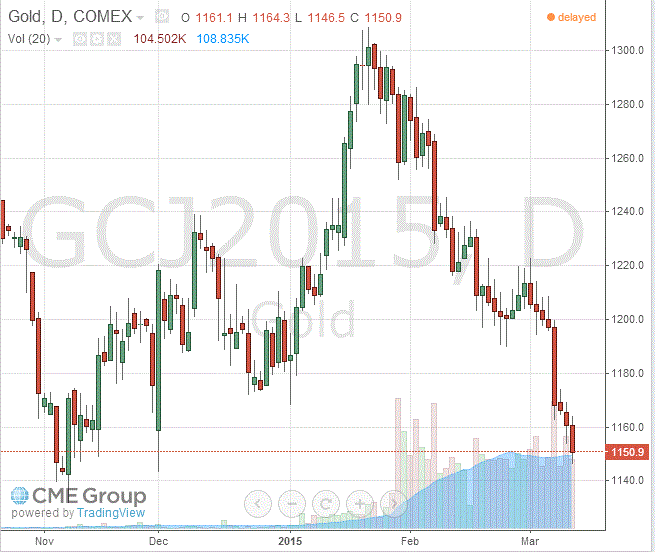Noticias del mercado
-
17:40
Oil: а review of the market situation
Prices for WTI crude oil fell sharply, dropping below $ 48 per barrel, which was associated with the publication of a report on stocks of petroleum products in the United States. Meanwhile, the price of Brent crude oil rose slightly, reaching $ 57 per barrel.
US Department of Energy reported that in the week from 28 February to 6 March crude oil reserves rose by 4.5 million barrels to 448.9 million barrels, while experts had expected growth to 4.8 million. Barrels. Commercial oil reserves in the US, according to figures remain at historical highs over the past 80 years. Oil reserves in Cushing terminal rose by 2.3 million barrels to 51.5 million barrels. Stocks has exceeded 50 million barrels for the first time on 31 May 2013. Gasoline inventories fell by 187,000 barrels to 239.9 million barrels, while analysts had expected a decline of 1.7 million barrels. Distillate stocks rose 2.5 million barrels to 125.5 million barrels. It was expected that the stock will decline by 2.3 million. Barrels. Meanwhile, refining capacity utilization rate increased by 1.2% - to 87.8%. Analysts expected a decline of 0.4%.
Recall yesterday's data from the American Petroleum Institute (API) showed that:
- Crude oil inventories in the US last week fell to 0.404 million. Barrels
- Distillate stocks in the United States for the week rose by 1.7 million. Barrels
- Gasoline inventories in the US for the week increased by 1.7 million. Barrels
- Utilization of oil refining in the US 87.5% versus 87.3% in the previous week
Pressure on prices also has a strengthening US dollar. The dollar index, which measures the strength of the US dollar against a basket of six major currencies, has now reached a maximum in April 2003. Recall, the dollar raises the price of US goods to importers that use different currencies such as the yen or the euro.
"A strong dollar creates unexpected difficulties for the oil market. Brent brings them heavier than WTI, as investors close their positions and take profit on the spread between the two brands, "- said the manager of commodity fund Tyche Capital Advisors Tariq Zahir. The price spread between WTI and Brent lost almost 40% since then, as the end of February reached a 13-month high of $ 13.
April futures price for US light crude oil WTI (Light Sweet Crude Oil) dropped to 47.66 dollars per barrel on the New York Mercantile Exchange.
April futures price for North Sea petroleum mix of Brent rose $ 0.23 to 57.10 dollars a barrel on the London Stock Exchange ICE Futures Europe.
-
17:20
Gold: а review of the market situation
Gold prices dropped significantly today, while reaching the lowest level in more than three months, due to the ongoing strengthening of the dollar and expectations of an earlier interest rate increase by the US Federal Reserve. It is worth emphasizing the precious metal may go down even more if the US stock indices and bond yields continue to rise.
Experts note that the Fed could start raising rates in the middle of this year (probably in June), and investors are preparing for the Fed next week to find out if he has not given up his intention to be patient regarding the timing recovery rates. Expectations of an increase of interest on loans have a negative impact on the precious metal because it fails to compete with earning assets during the period of rising rates.
Pressure on prices also has increasing European stock markets after a marked decline in the previous session.
Meanwhile, recent data by Bloomberg showed that the assets of exchange traded funds that invest in gold, fell to its lowest level in the last month and a half. By the closing bell Tuesday they dropped to 6.5 tons - up to 1653 tons. This is the lowest figure since January 26. Within two weeks of continuous decline fund assets fell by 27 tons. The main outflow of clients' funds fell on the world's largest exchange-traded fund SPDR Gold Trust, whose assets have declined over the two weeks of 18.2 tons to 753 tons.
Small effect has also statistics on China. As previously reported, the volume of industrial production grew by + 6.8% compared to the same period last year, after rising 7.9% in December. Industrial production growth was below economists' forecasts (+ 7.6%). Investments in fixed assets in urban China in January-February compared to the same period last year increased by 13.9%. Thus, the growth of this important indicator of activity in the construction sector fell short of economists' forecast was 15.1%. Growth in retail sales in January-February compared to the same period last year was 10.7%, slowing down against the annual growth in December at 11.9%. The forecast for January and February was + 11.5%. Weaker-than-expected data highlighted concerns about the Chinese economy, reviving speculation that policy makers will have to resort to fresh stimulus measures.
As for the situation in the physical market, the decline in prices to a minimum of three little increased demand for the precious metal from Asian buyers. Prize for gold in China compared to London was about $ 5 per ounce.
April futures price of gold on the COMEX today fell to 1150.90 dollars per ounce.
-
12:20
Oil: Brent Crude further down after yesterday's slump – WTI up
Oil traded mixed on Wednesday with Brent Crude losing -0.11%, currently trading at USD56.33 a barrel - setting new one-month lows. Yesterday Brent slumped by -3.30%. West Texas Intermediate added +0.19% currently quoted at USD48.38.
Brent Crude was weighed down by a broadly stronger U.S. dollar as the commodity is dollar-denominated. WTI took some support from U.S. stockpiles who registered an unexpected drop. Stockpiles of the world largest consumer of oil declined by more than 400,000 barrels, reported the American Petroleum Institute.
Now all eyes are on official data from the U.S. Energy Information Administration on U.S. Crude Oil Inventories due at 14:40 GMT.
In Libya two oil fields are shut after IS attacks fuelling concerns over supply risks.
On Sunday OPEC Secretary-General Abdullah al-Badri said that OPEC members should not lower production as this would only help U.S. producers with their higher-cost shale. Data from Baker Hughes on Friday showed that U.S. rig-numbers further declined by 63 - the lowest count since June 2011.
Oil prices declined by almost 60% between June 2014 and January 2015 and recovered by almost 35% in 2015.Although prices rebounded after setting new lows, worldwide supply still exceeds demand in a period of low global economic growth, pushing stockpiles to record highs, weighing on prices.
-
12:00
Gold at 3-month low as strong greenback weighs
Gold continued to decline for the eight consecutive day and is trading at 3-month lows as a stronger U.S. dollar weighs - with the euro trading at 12-year lows and racing toward a record quarterly drop. Better-than-expected U.S. jobs data reported last Friday added to expectations that the FED will hike interest rates rather sooner than later sending the precious metal down. A U.S. rate hike is now expected to happen possibly as soon as June. Physical demand for bullion could not support the price of gold.
A stronger U.S. dollar and the prospect for higher U.S. rates recently weighed on the precious metal as the precious metal is dollar-denominated and not yield-bearing.
Continuing uncertainty over Greece could not support the price of gold Continuing uncertainty over Greece weighs on the markets. On Monday ECB president Mario Draghi urged Greek officials to let return Eurozone-representatives to Greece in order to examine the government's books as a precondition for further financial aid. Greece agreed on allowing experts from the ECB and IMF to start their work today. Yesterday German Finance Minister Wolfgang Schäuble said that Greek officials must stop wasting time and work on the planned reforms.
Gold is currently quoted at USD1,156.80, +0,40% a troy ounce. On Thursday the 22nd of January gold reached a five-month high at USD1,307.40. Yesterday bullion traded as low as USD1,155.00.
-
10:20
Press Review: Draghi Says ECB Measures Can And Will Restore Inflation to Goal
BLOOMBERG
Draghi Says ECB Measures Can And Will Restore Inflation to Goal
(Bloomberg) -- Mario Draghi said the European Central Bank's expanded asset purchases will succeed in pushing inflation in the euro area back toward its goal.
"We can deploy and we will deploy monetary policy in a way that can and will stabilize inflation in line with our objective," the ECB president said at a conference in Frankfurt, three days into his 1.1 trillion-euro ($1.2 trillion) bond-buying program. "Our monetary policy is certainly supporting the recovery."
In his first public appearance since QE started, Draghi can point to falling yields on government debt and a slide in the euro as signs that the program to buy 60 billion euros a month of sovereign and private-sector debt is making a mark. What he can't yet show is whether banks and companies will respond by putting the fresh cash to work in the real economy.
REUTERS
Kuwait expects OPEC to continue policy beyond June(Reuters) - OPEC is likely to maintain its production policy at a meeting in June, Kuwait's OPEC governor said on Tuesday in the first public comment on what would be a crucial decision to determine the direction of global oil prices in the second half of the year.
Many OPEC oil ministers including Saudi Arabia's Ali al-Naimi have defended the organization's November decision not to cut production but instead defend market share and curtail the output of more expensive producers such as the United States.
The accord sent oil prices below $50 per barrel, extending a sharp decline that began in June amid a global glut of crude.
Source: http://www.reuters.com/article/2015/03/10/us-eurozone-greece-varoufakis-idUSKBN0M60MN20150310
BLOOMBERG
Japan Still Far From Done Cheapening Yen, Survey Suggests
(Bloomberg) -- Japan's central bank is far from done driving down the yen if it wants to secure a 2 percent inflation target next year, a survey of economists by Bloomberg News shows.
The median estimate of 27 economists in a survey March 5-10 shows that the yen needs to fall to 140 per dollar, a level last seen in 1998, to help the Bank of Japan meet its goal. Even after a 23 percent decline since Governor Haruhiko Kuroda began record monetary stimulus, that means a further 13 percent drop from the current level.
Kuroda and his colleagues are projected to step up their stimulus later this year, once it becomes clear that it's unlikely to achieve a 2 percent increase in consumer prices in or around the 12 months starting in April, a separate survey shows. What's unclear is whether politicians, Japan's trading partners and the small companies hurt by a weaker yen would tolerate actions that sent the yen down so much.
-
01:02
Commodities. Daily history for Mar 10’2015:
(raw materials / closing price /% change)
Oil 48.29 -3.42%
Gold 1,161.70 +0.14%
-


